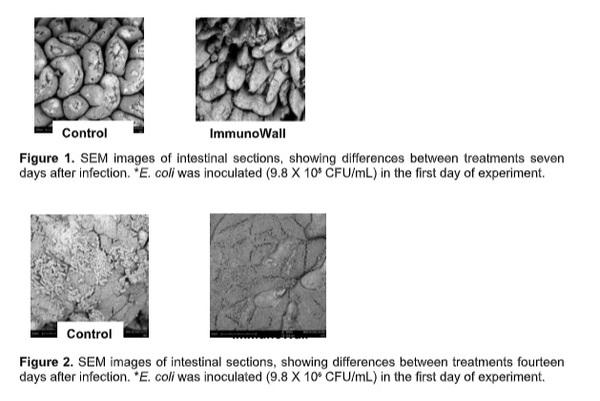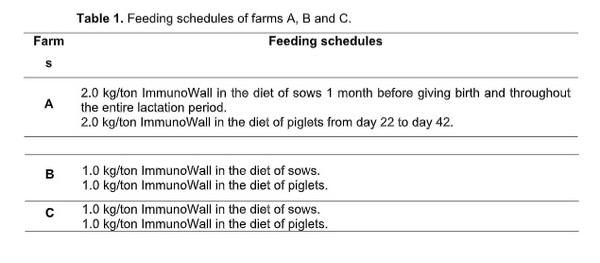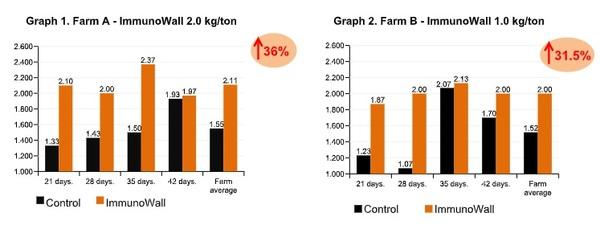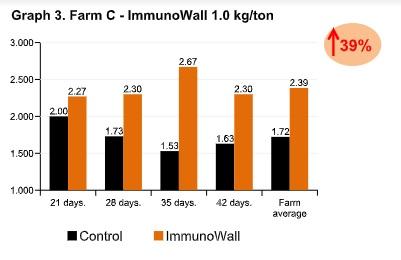The impacts of African Swine Fever on Brazilian Pig Farming: ImmunoWall as a solution for animal health and nutrition
Published: April 28, 2020
By: Liliana Borges and Melina Bonato (R&D, ICC Brazil)
Recently, Pig Farming suffered a major impact on world production. In September 2018, the African Swine Fever Virus (ASFV) was detected in subsistence pigs in China and Romania, and in wild boars in Belgium.
Brazil was directly affected by the effect of the ASFV crisis. In the first quarter of 2019, Brazilian exports of pork had China as their main destination, representing 24.9% of total Brazilian exports and approximately 33,635 tons of pork in natura. The increase in export demand boosted production and slaughter in the first quarter of 2019, when 11.31 million pigs were slaughtered, representing a 5.5% increase over the same period in 2018 (IBGE, 2019).
Current growing projections of Brazilian pork production are related to exports to China, which, according to USDA data (2019), remains with the largest pork herd and is the largest producer and largest consumer of pork in the world. Thus, with the advance of ASFV and the consequent preventive slaughter of animals, Brazil and other countries try to supply the high demand of meat consumed by the Chinese.
The ASFV outbreak, as well as other recurring diseases, strengthens the food safety concept, which is becoming increasingly evident in the animal food production industry, mainly those that are exported. The growing demand for natural and healthy ingredients that make up the food and nutritional diets of farm animals has become increasingly common. This scenario has been gaining strength in Brazil and worldwide, constituting major investments in research and new technologies aimed at meeting adhesion by the industry.
ICC Brazil is a company that creates solutions for animal health and nutrition, investing millions in research, thus ensuring greater efficiency of products and bringing safety to consumers. Recognized in Brazil and abroad for its innovative capacity, our company creates products based on sugarcane yeast for all animal phases and species.
All products developed by ICC Brazil features elements that stimulate immunomodulation, thus improving immune response, controlling the population and action of
pathogenic bacteria, among others, and favoring intestinal health, consequently enhancing animal performance.
pathogenic bacteria, among others, and favoring intestinal health, consequently enhancing animal performance.
ImmunoWall® stands out from other products in the market as it is composed of a dense cell wall of Saccharomyces cerevisiae yeast and has high concentrations of β-glucans and MOS, thus resulting in an additive with proven results and great cost-benefit. MOS is known for its ability to agglutinate pathogens (with fimbriae), such as several
gram-negative strains (E. coli and Salmonella). MOS provides a bonding place for pathogens in order to prevent colonization in the intestinal epithelium, and such bacteria are agglutinated and excreted together with the indigestible part of the fiber. β-glucans, in turn, are known as modulators or stimulants of the immune system because, when in contact with phagocytes, allow them to recognize the binding of β-1,3 and 1,6; then, specific cytokines that initiate a chain reaction to induce immunomodulation and improve the innate immune system response are stimulated.
gram-negative strains (E. coli and Salmonella). MOS provides a bonding place for pathogens in order to prevent colonization in the intestinal epithelium, and such bacteria are agglutinated and excreted together with the indigestible part of the fiber. β-glucans, in turn, are known as modulators or stimulants of the immune system because, when in contact with phagocytes, allow them to recognize the binding of β-1,3 and 1,6; then, specific cytokines that initiate a chain reaction to induce immunomodulation and improve the innate immune system response are stimulated.
ImmunoWall® is one of our solutions that assists in the control of pathogens and greatly increases animal immune response, thus preparing them to the challenges faced in the field.
In a study published by Alcantara et al. (2015), weaned piglets at 28 days old were infected with E. coli (orally, 9.8 x 10 8 UFC/ml) and divided into two groups: control and
supplementation with ImmunoWall® at 2kg/ton. The supplemented group showed improvement in intestinal integrity, reduced frequency of diarrhea, fasting E. coli (-33%) and feces (-66%) count, resulting in fewer bacteria adhering to the villus surface (Figures 1 and 2) compared to the control group. These results showed that the yeast cell wall has an effective action against pathogenic microorganisms, and consequently improves gut health of animals.
supplementation with ImmunoWall® at 2kg/ton. The supplemented group showed improvement in intestinal integrity, reduced frequency of diarrhea, fasting E. coli (-33%) and feces (-66%) count, resulting in fewer bacteria adhering to the villus surface (Figures 1 and 2) compared to the control group. These results showed that the yeast cell wall has an effective action against pathogenic microorganisms, and consequently improves gut health of animals.

Another study was carried out by Chang (2011) simultaneously in three commercial farms of swine, with an average of 3,000 hybrid Landrace/Yorkshire/Duroc piglets per farm. A control group and a group supplemented with ImmunoWall® were the treatments studied. The farms had a history of sporadic cases of E. coli and Salmonella, and no APCs were used during the study period. Feeding schedule of each farm followed the Table 1 below:

At each farm, blood samples were collected from three piglets from the control group and from the the treated group at 21, 28, 35 and 42 days to determine the total level of Ig.
Piglets from groups fed with diets that had ImmunoWall® showed better Ig levels compared to control groups, providing more efficient immune system responses. There was an
increase in Ig level at the weaning period (day 1 to 21) as a result of passive immunity transmission from sows to piglets. The average Ig level from day 1 to 42 also increased; this reflects the stability of the immunity maintenance score of these piglets (Graphs 1, 2 and 3).
Piglets from groups fed with diets that had ImmunoWall® showed better Ig levels compared to control groups, providing more efficient immune system responses. There was an
increase in Ig level at the weaning period (day 1 to 21) as a result of passive immunity transmission from sows to piglets. The average Ig level from day 1 to 42 also increased; this reflects the stability of the immunity maintenance score of these piglets (Graphs 1, 2 and 3).


Concern about food safety of ingredients and additives used in animal feed is a growing worldwide trend, mainly because it is directly related to animal health. ImmunoWall® is one of our solutions that assists in the control of pathogens and greatly increases animal immune response, thus preparing them to the challenges faced in the field.
References
Alcantara, A.A et al. Yeast cell wall supplementation in the diet of weaned piglets and its effect on gut health. Joint Animal Meeting 2015, July 2015, Orlando/USA.
Chang, C. C. Yeast cell wall supplementation in the diet of sows and weaned piglets and its effect on Ig levels piglets. National Chiayi University, Chiayi, Taiwan, 2011 (unpublished data).
IBGE, Indicadores IBGE: Estatística da produção Pecuária. PRODUÇÃO ANIMAL NO 1º TRIMESTRE DE 2019: Abate de animais, Suínos. p.14-19. 2019.
Related topics:
Authors:
ICC
Recommend
Comment
Share

Would you like to discuss another topic? Create a new post to engage with experts in the community.







.jpg&w=3840&q=75)